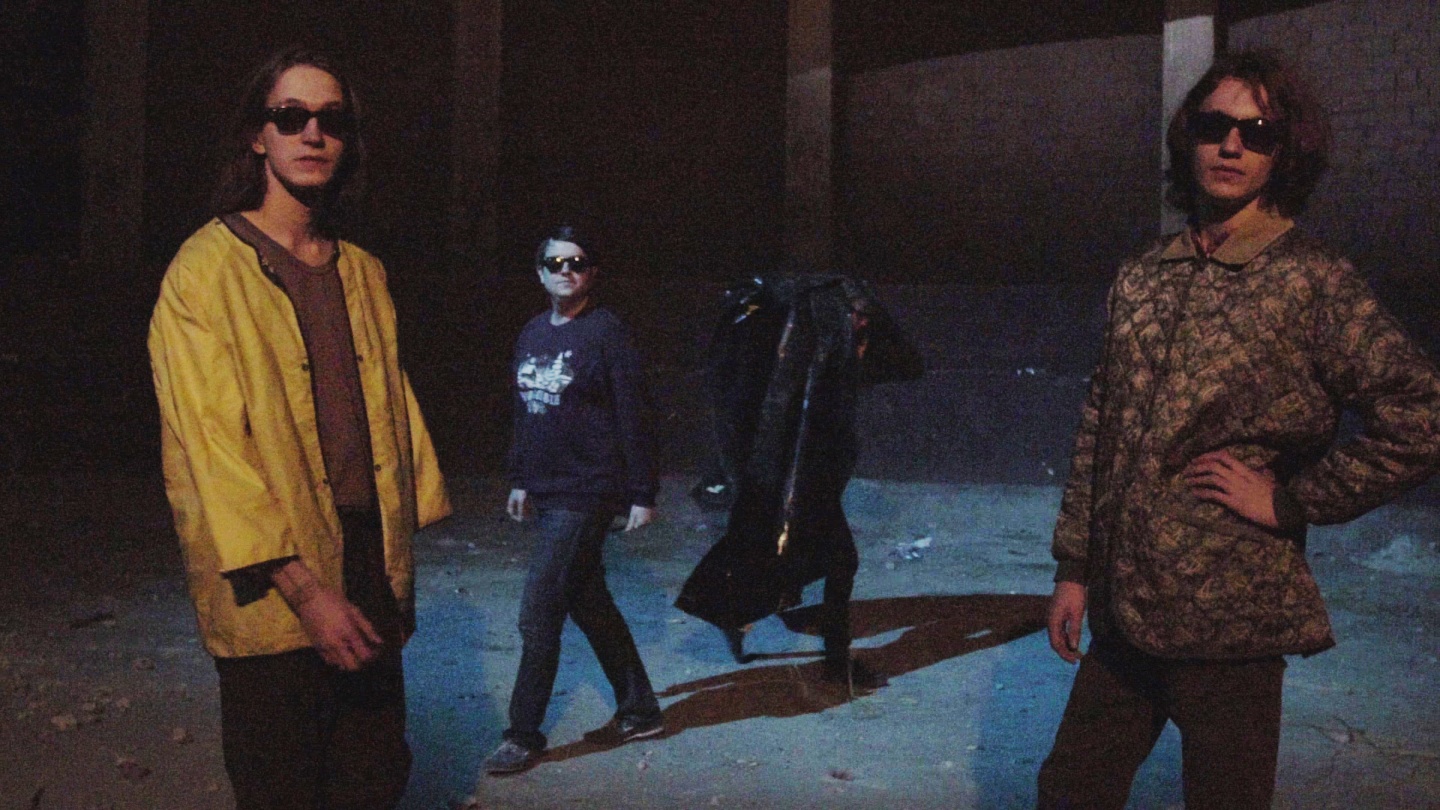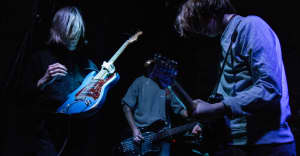 Still from "Ashley"
Still from "Ashley"
How far away summer 2016 seems now. It was then that I met Ukrainian four-piece Bichkraft, who’d finally made it to New York after major visa issues in Kiev. Zenya Fenec, Dima Novichenko, Serzh Kupriychuk, and Jenia Bichowski were spending their first-ever U.S. visit shut in a Greenpoint studio, working on demos, preparing for shows at DIY haunts Trans Pecos and Shea Stadium, and “eating burgers and drinking beer...and tequila,” as Dima told me.
Dima and Serzh are chatty and goofy, while Zenya and Jenia are more serious. They’re all low-key stylish with heavy accents and dry senses of humor. When we spoke, they were hot off the release of Shadoof, a dark and noisy LP that’s almost Murray Street-like in its playful experimental bent, and that they recorded at home in Kiev last year and released on Wharf Cat Records in June. But before the studio sessions in America, they hadn’t recorded for half a year. “It’s very exciting to start working on songs here,” Zenya told me. “We are preparing simple patterns, like sketches — demo versions of songs.”
For a while, we sat around the studio and talked about what it’s like to make music in Ukraine, and how much they all love to be together, just jamming. One of the demos they were working on in July has since become the frenzied “Ashley,” which now has a video and everything. Premiering today, the clip shows off Bichkraft’s scrappy, anarchistic charm. There’s something about getting lost in this music that feels good right now; it always sounds like things are teetering on the brink of destruction — but it manages to hold itself together, and there's beauty in that.
Tell me about how you met and started playing music together.
ZENYA: We knew each other before, and we played in different bands. Me and Jenia played in another Ukranian band, before.
JENIA: Everyone is close, everyone knows each other.
DIMA: It's a really small scene. We started to play together, and then we became a band. We had a place, a garage. It was deep winter and we didn't record anything there. It was really cold! Really, really cold! We played in jackets and hats because it was so cold. That was the beginning of Bichkraft.
SERZH: Our first show, too, was in a garage in Kiev. It was a crazy one, because hours before we started, the electricity disappeared. It had begun a strange rain, and a tree falls on the electricity. And the electricity disappeared. The guy said "Oh, don't worry we will bring a generator." He brought it but there were these sounds, this great huge noise. All the amps sounded like "Shhhhhshhhhhshh," so no one could understood where the song began or finished.
What's your studio like at home?
SERZH: It looks like this studio, but destroyed by a little rocket.
JENIA: It's an old house. More than 100 years old.
SERZH: In another house we have a studio. It's like the rehearsal room, but we can record there. That's how we made our second album. It's always important for us to move to other places to record new songs. It's our style. We can't stay in the place where we have recorded.
How is Kiev different from New York?
JENIA: I lived without a job for a long time [in Kiev]. And a lot of people can live without a lot of money.
DIMA: There are not such fast moments in Kiev. You don't have as many possibilities. It’s more calm.
SERZH: [In Kiev] you need to choose: get a job or make art. You can't complain, and you can't do both. You can't feel free if you have job, it takes a lot of time.
ZENYA: In a musical sense, it's much simpler. We know almost every musician from Kiev of our age who plays our kind of music. Just a small city, really.
SERZH: It's not small, but you can't compare the amount of bands in New York with the amount of bands in Kiev. It's different.
ZENYA: We talked with Serzh yesterday about the feeling of New York, and he said that, “Everyone here is going to be the best. Anything he does, he is going to try as hard as possible.” Most people are bored of what they are doing in Kiev.
JENIA: Yes. Bored of life.
Are you guys bored?
ALL: No.
ZENYA: That's why we're here.
What would you be doing if you weren't making music?
ZENYA: Surviving.
JENIA: I'd become a hobo, maybe.
SERZH: I have no idea what my life would be like.
DIMA: I cannot even imagine this!
There's kind of a lightness in Shadoof that’s a little groovier than usual for you.
JENIA: We have country rhythms in the last songs that we recorded.
DIMA: House rhythms, too. We experimented with new drum synthesizers and drum machines. We're always searching for a new sound, so it always changes.
ZENYA: For Shadoof, we worked on the sounds of the album and the arrangements for about half a year, and recorded it for two or three months. So we looked very deeply at each detail. But here [in New York], we tried to make things maybe a little simpler ...
DIMA: ... spontaneous
ZENYA: Yeah, spontaneous: jamming and to keep some light feeling. There's a lot of very cool equipment that is new for us. We're not familiar with it, but we are trying and experimenting. It is a way we are going to get a new sound for this record.
Do you guys all write the songs together?
ZENYA: Sometimes one of us has some sketches, or we play guitars together. Or Jenia and Serzh sketch the drum and bass. But we are making the song together, always.
SERZH: It's important to keep the songs with a jammy feeling.
What kind of music do you listen to?
DIMA: We have the same basic musical tastes, but if you look wider, we have other influences, and also different influences.
JENIA: It's four bands, for us. Jesus and Mary Chain, Polvo, Deerhunter, and Spacemen 3.
JENIA: Dima loves jazz, Serzh hates jazz.
SERZH: My favorite musician is Liz Harris, from Grouper. I think she is the best.
Are you guys together all the time?
DIMA: No, but most of the time.
JENIA: We don't have any other friends.
DIMA: I don’t remember a week this year where we didn’t see each other. We see each other every week, for sure.
So you're close?
SERZH: We don't live close.
Like in your hearts, though.
DIMA: [Laughs] Yes.
Bichkraft's Shadoof is out now on Wharf Cat.
